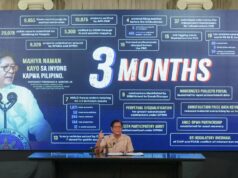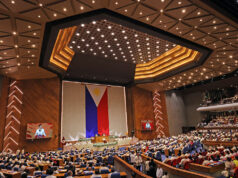House committee OK’s proposed traffic powers
THE HOUSE COMMITTEE on Transportation has approved the proposed Traffic Crisis Act, which is being eyed to address the traffic woes in Metro Manila, Cebu and Davao cities.
The proposed measure will :establish a strong primary policy, planning, programming, coordinating, implementing, regulating, enforcement, and administrative authority” under the control and supervision of the Department of Transportation (DoTr), which will have the exclusive power to control, manage, and regulate land-based traffic and structures in the concerned areas.
It also seeks to “harmonize all traffic rules, regulations, ordinances, issuances, and policies in the Metropolitan Areas to achieve a comprehensive and integrated statutory and regulatory framework for land-based traffic.”
The DoTr Secretary will be designated as the “traffic chief” with “full power and authority to streamline the management of traffic and transportation and control road use in the identified metropolitan areas.”
The traffic chief will also be the alter ego of the President, with the power of supervision over all local government units within the metropolitan areas.
This is different from the Senate version of the bill, which proposes the creation of an office and the designation of a traffic czar.
The bill authorizes the President, through the traffic chief, to enter into negotiated contracts for priority projects for the construction, repair, restoration, rehabilitation, improvement, or maintenance of critical infrastructure, projects and facilities and directly related procurement of goods and services.
In the implementation of this measure, no court, except the Supreme Court, may issue any TRO or preliminary injunction against the government or any of its subdivisions, official, or any person or entity, whether public or private acting under government direction, to restrain, prohibit or compel the following acts related to its implementation:
(a) Bidding out or procurement of the Priority Projects, including infrastructure projects, software or IT components and attendant acquisition of the goods and consulting services, as identified by the Traffic Chief and submitted to the JOC;
(b) Acquisition, clearance, and development of the right-of-way (“ROW”) and/or site or location of any transportation project identified by the Traffic Chief and submitted to the JOC;
(c) Commencement, prosecution, execution, implementation, operation of any transportation project;
(d) Termination or cancellation of any transportation project;
(e) Opening of private village gates necessary to provide alternate routes throughout the effective period of the Act;
(f) Termination or amendment of PUV franchises; and
(g) Undertaking or authorization of any other lawful activity necessary for any transportation project.
A Special Traffic Crisis Court will also be created, which will have jurisdiction to hear and expeditiously resolve all actions related to the implementation of the measure, except those that will be filed against public officials before the Joint Committee of the Commission on Audit, Civil Service Commission, and the Ombudsman. — interaksyon.com



